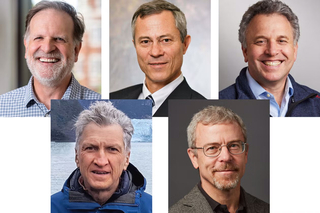Steven Berry, Gary Brudvig, Jonathan Ellman, Leonid Glazman, and Mark Hochstrasser were elected to the academy, one of the highest honors bestowed on a U.S. scientist or engineer.
Five Yale professors elected to National Academy of Sciences

Top row, from left: Steven Berry, Gary Brudvig, and Jonathan Ellman. Second row: Leonid Glazman and Mark Hochstrasser.
Five Yale faculty members have been elected to the prestigious National Academy of Sciences in recognition of their distinguished and continuing achievements in original research.
Steven Berry, Gary Brudvig, Jonathan Ellman, Leonid Glazman, and Mark Hochstrasser are among 120 new members and 30 international members elected to the academy. Election to the academy is considered one of the highest honors that can be bestowed on a U.S. scientist or engineer.
The new members bring the total number of active members to 2,662 and the total number of international members to 556. International members are nonvoting members with citizenship outside the United States.
Steven Berry is the David Swensen Professor of Economics in Yale’s Faculty of Arts and Sciences and the inaugural faculty director of the Tobin Center at Yale. His research focuses on empirical applications and methodology in the broad field of Industrial Organization. He has analyzed a wide range of markets, including automobiles, airlines, and media. Berry is a winner of the Frisch Medal of the Econometric Society and is an elected Fellow of that society. He is also an elected member of the American Academy of Arts and Sciences. He was named the 2017 Distinguished Fellow of the Industrial Organization Society and is a research associate at the National Bureau of Economic Research.
Gary Brudvig is the Benjamin Silliman Professor of Chemistry and professor of molecular biophysics and biochemistry in FAS, professor of materials science at Yale School of Engineering & Applied Science (SEAS), and director of the Yale Energy Sciences Institute. A member of the Yale faculty since 1982, Brudvig’s lab works to understand the chemistry of water oxidation in natural photosynthesis and to model this water-oxidizing chemistry with synthetic catalysts. Brudvig is an Alfred P. Sloan Research Fellow, and an elected fellow of the American Association for the Advancement of Science, the Connecticut Academy of Science and Engineering, and the American Academy of Arts & Sciences.
Jonathan Ellman is the Eugene Higgins Professor of Chemistry in FAS and professor of pharmacology at Yale School of Medicine. His lab works to synthesize new chemical matter in order to discover and develop compounds with incredibly diverse properties and applications ranging from precise tools to study biological phenomena, to pharmaceutical agents to treat unmet medical conditions. A Yale faculty member since 2010, Ellman is an Alfred P. Sloan Fellow, winner of the American Chemical Society Arthur C. Cope Scholar Award, fellow of the American Association for the Advancement of Science, and member of the American Academy of Arts & Sciences.
Leonid Glazman is a Donner Professor of Physics in FAS, professor of applied physics at SEAS, and member of the Yale Quantum Institute. As a researcher, he is interested in dynamic properties of quantum low-dimensional interacting systems. These include a diverse set of objects, such as low-dimensional quantum fluids, topological materials, and various condensed matter implementations of qubits. He is a winner of a Humboldt Research Award for senior U.S. scientists, a Creativity Award from the National Science Foundation, and he is a fellow of the American Physical Society.
Mark Hochstrasser is the Eugene Higgins Professor of Molecular Biophysics and Biochemistry and professor of molecular, cellular, and developmental biology in FAS. He is part of the Yale Cancer Center and has an appointment with the Biomedical Sciences Program at Yale School of Medicine. A member of the Yale faculty since 2000, Hochstrasser’s work aims at understanding at a molecular level how specific eukaryotic proteins are rapidly degraded within cells even while most proteins are spared. He is a member of the American Academy of Arts and Sciences, the American Society for Biochemistry and Molecular Biology, the American Association for the Advancement of Science, and the American Society for Microbiology.
The National Academy of Sciences is a private, nonprofit institution established by President Abraham Lincoln in 1863 and charged with providing independent, objective advice to the nation on matters related to science and technology.
Media Contact: Yale OPAC opac.media@yale.edu